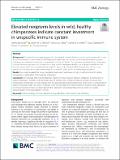Files in this item
Elevated neopterin levels in wild, healthy chimpanzees indicate constant investment in unspecific immune system
Item metadata
| dc.contributor.author | Behringer, Verena | |
| dc.contributor.author | Stevens, Jeroen M.G. | |
| dc.contributor.author | Wittig, Roman M. | |
| dc.contributor.author | Crockford, Catherine | |
| dc.contributor.author | Zuberbühler, Klaus | |
| dc.contributor.author | Leendertz, Fabian H. | |
| dc.contributor.author | Deschner, Tobias | |
| dc.date.accessioned | 2019-11-21T17:30:05Z | |
| dc.date.available | 2019-11-21T17:30:05Z | |
| dc.date.issued | 2019-05-16 | |
| dc.identifier | 263483366 | |
| dc.identifier | 145e7b79-0be0-4648-8191-b95b265ca9d3 | |
| dc.identifier | 85065901107 | |
| dc.identifier.citation | Behringer , V , Stevens , J M G , Wittig , R M , Crockford , C , Zuberbühler , K , Leendertz , F H & Deschner , T 2019 , ' Elevated neopterin levels in wild, healthy chimpanzees indicate constant investment in unspecific immune system ' , BMC Zoology , vol. 4 , 2 . https://doi.org/10.1186/s40850-019-0041-1 | en |
| dc.identifier.issn | 2056-3132 | |
| dc.identifier.other | ORCID: /0000-0001-8378-088X/work/65013930 | |
| dc.identifier.uri | https://hdl.handle.net/10023/18978 | |
| dc.description | Funding was provided by Max Planck Society as well as the Deutsche Forschungsgemeinschaft (DFG) and conducted as part of the research group “Sociality and Health in Primates” (FOR2136, DE 1135/2–1 and LE1813/10–1). CC received funding from, the European Research Council (ERC) under the European Union’s Horizon 2020 research and innovation programme (Grant Agreement No 679787). | en |
| dc.description.abstract | Background: Ecological immunology proposes that the optimal immune defence, and the costs coming with it, vary across environments. In environments with higher pathogen load, the immune system should experience greater challenges and, therefore, investment in maintaining it should be higher. The biomarker neopterin allows monitoring of innate immune responses, and is therefore an ideal tool to investigate the effects of ecological variables on the immune system. Here, we compared urinary neopterin levels of apparently healthy chimpanzees without acute symptoms of sickness across two environments: In captivity (22 zoos) and in the wild (two populations). Results: Our results revealed that urinary neopterin levels were nearly twice as high in wild compared to captive chimpanzees, independent of chimpanzee subspecies. Conclusion: We conclude that wild chimpanzees experience more frequent immune challenges in comparison to captive individuals. Therefore, wild individuals have to allocate more energy to immune function and away from reproduction and growth. Our data indicate that the generally delayed development of wild animals in comparison to captive individuals might not only be related to lower energy intake but might result from greater energy allocations to immune function. Finally, our data highlight the importance of understanding immune costs for accurate characterization of energy budgets in animals. | |
| dc.format.extent | 7 | |
| dc.format.extent | 687884 | |
| dc.language.iso | eng | |
| dc.relation.ispartof | BMC Zoology | en |
| dc.subject | Captive and wild living | en |
| dc.subject | Costs | en |
| dc.subject | Ecoimmunology | en |
| dc.subject | Energy allocation | en |
| dc.subject | Immune response | en |
| dc.subject | QL Zoology | en |
| dc.subject | Animal Science and Zoology | en |
| dc.subject | NDAS | en |
| dc.subject.lcc | QL | en |
| dc.title | Elevated neopterin levels in wild, healthy chimpanzees indicate constant investment in unspecific immune system | en |
| dc.type | Journal article | en |
| dc.contributor.institution | University of St Andrews. School of Psychology and Neuroscience | en |
| dc.contributor.institution | University of St Andrews. Institute of Behavioural and Neural Sciences | en |
| dc.contributor.institution | University of St Andrews. Centre for Social Learning & Cognitive Evolution | en |
| dc.identifier.doi | https://doi.org/10.1186/s40850-019-0041-1 | |
| dc.description.status | Peer reviewed | en |
This item appears in the following Collection(s)
Items in the St Andrews Research Repository are protected by copyright, with all rights reserved, unless otherwise indicated.

